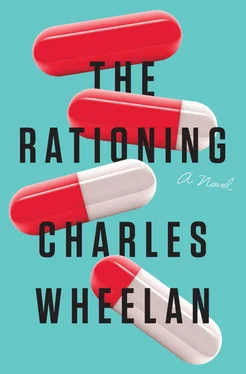“What does the Prime Minister have in mind?” the Ambassador asked skeptically. He felt a warm glow of inner satisfaction. He had done it. He had taken the conversation in the direction it needed to go. He had arrived at the California Pizza Kitchen to ask for a donation of a lifesaving drug. And now, with the pizzas barely having arrived, Patel was beginning to look like the supplicant.
“We’re being entirely candid here?” Patel asked earnestly.
“Of course,” the Ambassador assured him.
“Something that puts him on equal footing with the President,” Patel said. “Something that makes India look like an equal partner.”
“We can make that happen,” the Ambassador replied, though there was a coolness in his tone that suggested the opposite. “Obviously the President has some political sensitivities of his own.”
“He does not want a poor country coming to the rescue,” Patel offered.
“No, no,” the Ambassador assured Patel in a tone that suggested, “Yes, yes.” The Ambassador explained, “The President is very sensitive to charges that he left the country vulnerable—that he’s responsible for this situation. He’s trying to steer a delicate political path here.”
“I can understand that,” Patel said.
“Yes, well, if there is a very public display in which India delivers the Dormigen that the U.S. somehow could not produce…”
Patel finished the thought, his voice laced with indignation: “The President must be horribly incompetent if India is coming to the rescue.”
The Ambassador said, “I’m just the messenger here. I think it’s pathetic that thousands of people could die because of his political vanity . ”
“I understand,” Patel said, his tone warming noticeably. “Of course, the President’s not the only one with political vanity!” They exchanged a knowing laugh at the expense of their political overlords. The waiter approached the table once again. Neither man had eaten more than a few bites.
“The food is okay?” the waiter asked with concern.
“Fine, fine,” the Ambassador said. “Can I take mine in a box?”
“I would like a box as well,” Patel said.
“I would like something sweet, however,” the Ambassador said. “Do you have ice cream?” he asked the waiter.
“Of course, sir. Chocolate, vanilla, and mango.”
“I’ll have mango!” the Ambassador exclaimed. “I love mango ice cream. Are the mangos in season?”
“I believe so,” Patel answered. “I’ll have the same.”
As the waiter walked away, the Ambassador continued, “Why don’t you consult with the Prime Minister. Ask him what he feels he needs: a phone call with the President, maybe a public ceremony in which the Indian Ambassador comes to the White House for formal recognition… I’m just thinking out loud here. I will advocate strenuously for whatever the Prime Minister proposes because there is absolutely no reason politics should get in the way of saving lives. But, please, make the PM aware that the White House is going to push back against anything the President feels makes him or the country look like a supplicant.”
“Well put. I understand completely,” Patel replied.
The waiter returned with the ice cream. “Will there be anything else?” he asked.
“Just the check,” the Ambassador answered.
As the waiter searched for the check in his small notepad, Patel produced a credit card. “Please, allow me,” he said.
“Thank you,” the Ambassador said. He leaned closer to Patel: “I think we can make this happen.”
“I hope so,” Patel replied. “I hope so.”
THE PRESSURE HAD BEEN BRIEFLY REDIRECTED FROM OUR team at the NIH to the biochemists, as we awaited their findings on the chemical structures of the virulent and indolent forms of the Capellaviridae virus. I awoke early and shared an awkward breakfast with Ellen. We watched television and said little to one another. I switched from channel to channel, eager to see how the Dormigen story was being covered. The Saudi Arabia hostage situation was the top story across channels. I imagined a crisis team like ours working in different rooms at the White House with the President yelling at them to make sure that no hostages were killed. The media seemed to have the bandwidth for one crisis at a time, so the Dormigen story had been bumped off the front page, literally in some cases, figuratively elsewhere. Most of the cable news programs were still using their “Dormigen Countdown” graphics. The White House had gained some traction in shaping the story. Our local morning program in D.C. did a story on a nearby hospital that was preparing measures to provide alternative care for patients who would be ineligible to receive Dormigen. That story, and most others, used our phrase “similar to a serious case of the flu” multiple times. But then they would cut almost immediately to Seattle, where Cecelia Dodds remained in an induced coma.
On the political side, there was a lot of waiting going on. The President had arrived back in Washington during the night. The Chief of Staff briefed him and others on what they were now referring to as “the California Pizza Kitchen Summit.” The next move would have to come from the Indian Prime Minister’s office. On the science side, we were also waiting. The NIH Director canceled our morning briefing, as there was little to discuss until we received more information from the biochemists. Meanwhile, Giscard had invited Jenna for breakfast, which she had accepted, much to my horror. So I was waiting for breakfast to be over, too.
The Speaker organized “No Rationing” protests in a number of cities. Several were scheduled for that afternoon. However, the agenda had been coopted by other progressive groups; the demonstrations now included protests against income inequality, domestic violence, sexual assault, and racial profiling. (The Democrats’ progressive wing prided itself on a lack of hierarchy, which took a toll on focus and strategy.) A Palestinian rights group offered up several speakers to address Israeli land annexation in the West Bank. In the end, the disparate causes rallied under the banner of “A Protest Against Unfairness and Oppression.” Predictably, no one without a nose ring showed up.
I was in no mood to see humor in any of this, but I now find it amusing that the Tea Party was blasting our Dormigen rationing plan at the same time. “This is exactly what happens when you put the government in charge of anything: rationing ,” populist radio host Chuckford Pickens told his loyal listeners. These anti-rationing diatribes bounced around the right-wing echo chamber for a while, though the sentiment wilted quickly when exposed to anything approximating logic. As the President pointed out in a moment of exasperation, the whole point of the free market is to ration goods, albeit using price rather than some other mechanism. (I vaguely recall my microeconomics professor saying the same thing.) Eleven thousand economists signed a petition affirming the importance of government patent protection to promote innovation, and government funding to promote the kind of basic research that often lays the groundwork for major pharmacological breakthroughs (like Dormigen). Chuckford Pickens disparaged the petition on his program, describing it as “more sad evidence that our universities have been totally hijacked by the left.” Several callers shared stories of lefty academic exploits; one concerned an Oberlin professor teaching a course called Gender and Sexual Identity in The Wire .
“ The Wire —like the TV show?” Pickens asked the caller incredulously.
“Yep,” the caller affirmed.
“My God, it’s not bad enough that you can watch television for college credit, now it also has to be about gender and sexual identity. You can’t even get credit for watching straight people on TV anymore! Can you believe that?” Pickens exclaimed, clearly pleased with his own analysis of the situation. “You know what we should do, we should get a copy of the Oberlin course catalog. Can we do that?” he asked his listeners, though the question was presumably directed to a producer in the studio. The answer must have been yes, because Pickens continued, “We’re going to do that.” The supposed logic of this meandering conversation, as best as I could infer, was that a handful of silly courses at Oberlin College somehow obviated the collective wisdom of eleven thousand economists, including twenty-one from the University of Chicago (a bastion of free-market thinking).
Читать дальше












